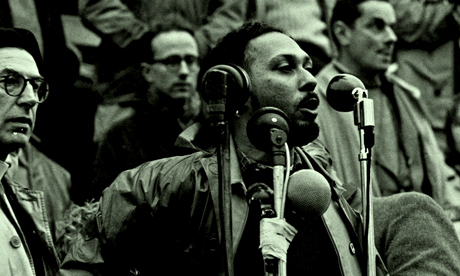John Akomfrah’s Stuart Hall film to be screened for Black History Month

Screen Shot from John Akomfrah’s film The Stuart Hall Project
“There’s a difference between a quaint evocation of the past and an open window looking straight down a stack of decades”, the great documentary photographer Walker Evans said. To director John Akomfrah’s credit, his latest film, a provocative portrait of the cultural theorist Stuart Hall, is very much the latter.
A composition of archival material culled from Hall’s many TV and radio appearances, home movies and rare historical documentary footage, The Stuart Hall Project is an absorbing multi-layered voyage through the turbulent social and political upheavals of the second half of the 20th century out of which the politics of the New Left emerged.
“What’s interesting is how so much of the history of post-war Britain is told by his thought,” Akomfrah says, describing the film as both a biographical study and an essay on identity – the interrogation of which had such a profound impact on Hall’s thinking.
“You know, we live in a society that is so relentlessly obsessed by the present, with the here and now, that actually, we value the importance of the present over the past. The film was in part a way of redressing the balance, sorting through the ghosts of history, if you like, that tell us so much about how we became what we are today.”
Born into a middle-class family of African, Scottish and Portuguese-Jewish descent in colonial Jamaica, Hall describes his origins in the film as “the home of hybridity”. He moved to England as part of the Windrush generation in 1951, just as Britain was nearing the end of its colonial power.
Charting the Suez Crisis, the civil rights movement and the rise of feminism to the Cold War arms race and the Vietnam War, Akomfrah’s film offers an unusually intimate account of the shaping of Hall’s thought, from his days as a bright young Rhodes scholar and co-founder of the New Left Review at Oxford, to his very public presence as one of Britain’s leading intellectuals over the decades.
Hall’s commitment to educational opportunities, social justice and he creative saw him become instrumental in the establishment of the first Centre for Contemporary Cultural Studies in Birmingham and, later, the Open University and Institute of International Visual Arts.
For Ghanaian-born Akomfrah growing up in West London in the 1970s, Hall was an icon, inspiring him to ask vital questions about his own identity, about what he was and what he could become.
“For the post-Windrush generation, there was this sense that society didn’t understand you, that people didn’t know who we were or what we were or even why we were here,” Akomfrah says, pointing to the profound influence that Hall’s intellectual interventions on identity, race and representation have had on his own work.
Akomfrah was a founding member of the Black Audio Film Collective in Hackney in the early 1980s (when, he laughs, the rents were attractive), a group which prided itself on taking the politics of representation seriously and questioning the mainstream media’s depiction of black people.
Under the free-market ideology of Thatcherism, the Collective took full advantage of what the Akomfrah today calls the “Janus-faced project” of deregulating British television to become one of the most of formally experimental, critically acclaimed groups to emerge as part of the black film movement in Britain at that time.
Stuart Hall was a consultant on Akomfrah’s directorial debut Handsworth Songs (1986), an experimental documentary about the race riots in Britain, and the film that brought the Black Audio Film Collective international acclaim.
Though the group was dissolved in 1998, Akomfrah is still based in Hackney with his production company Smoking Dogs Films. He has previously said that The Stuart Hall Project feels like the film he’s been preparing for “possibly all his working life” and it is clear that the work is first and foremost a tribute to a thinker whose legacy has, in many ways, been woefully neglected.
Set to the music of restless soul Miles Davis, the man whose various moods Hall says matched the evolution of his own thinking, Akomfrah’s film that serves as a reminder that the ‘ghosts of history’ will always inform the unfinished conversation of who and what we are as a society.
Indeed, one of the most unsettling scenes in the film is television footage of a clearly exasperated Hall locked in a TV show debate on immigration when a fellow panellist asks: “But why are they [immigrants] all coming here?” The Stuart Hall Project is certainly a thought-provoking riposte.
A special screening of The Stuart Hall Project with a talk and discussion by Mike Berlin will be hosted by Birkbeck University of London and The New Black Film Collective at Stratford East Picturehouse on 10 October as part of Black History Month
